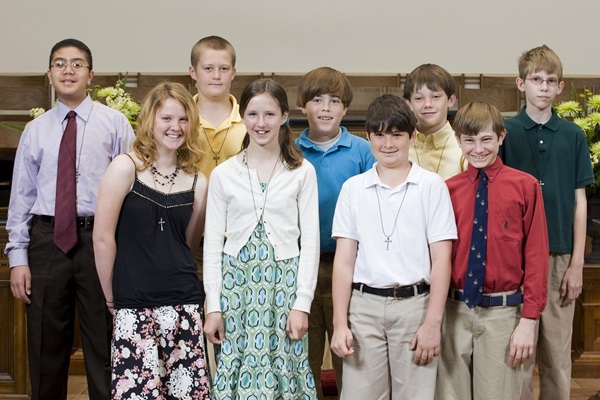What does "confirmation" mean?
United Methodists use the term "confirmation" to mark the first time a baptized Christian publicly "confirms" their intention to live the vows of the baptismal and membership covenant and so becomes a professing member of the local congregation and The United Methodist Church.
Can I be confirmed more than once?
We expect that there may be several occasions during one's Christian life when one may wish to re-affirm or re-profess their commitment to live the baptismal and membership covenant faithfully. Doing so more than once does not change or add to one's status as a professing member in the Church. So while we encourage people to re-affirm as they find need, we do not call any subsequent reaffirmations or re-professions "confirmation."
I thought "confirmation" referred to a series of classes over weeks or months. Was I wrong?
While the process of preparing to confirm or profess one's commitment to live out the baptismal and membership covenant may take considerable preparation, which may include classes, retreats, service projects, and other spiritual exercises, the term confirmation properly belongs to what we do in the ritual when we publicly confirm our commitment.
What is the minimum age for confirmation in The United Methodist Church?
Our Judicial Council has clarified for us that the determination of when someone is ready to say with integrity that they will live out the baptismal and membership vows is left solely to the appointed pastor. The appointed pastor has full discretion to decide whether someone is ready, regardless of their age. See Judicial Council Decision 1032.
That said, the nature of the questions we ask and the vows we take requires some degree of agency-- ability to act on one's own behalf-- that is more compatible with at least early adulthood than late childhood. A number of our ecumenical partners, most notably bishops in The Episcopal Church, have set confirmation no sooner than age 16 (the average age when a child may first legally declare emancipation and enter into contracts across the US). Discipleship Ministries has noted that what became a common time for American Protestants of late middle school (7th or 8th grade) in the 19th and early 20th centuries, as it remains common today, corresponded roughly to early adulthood in those times, but no longer does today. We do well to consider all environmental and contextual factors that may surround a given child as we consider the "earliest" age at which we may decide to offer professing membership, and so confirmation.
I wasn't confirmed when I was a teenager. Is it too late for me to be confirmed now that I am an adult?
No, it is not. Remember, confirmation as such is not a process, though preparing for it should involve some kind of process. Confirmation is simply the first time a baptized Christian makes their public commitment to live out the baptismal and membership covenant among us and so become a professing member with us. You may be confirmed at 16, 60, or 92!
I am coming to The United Methodist Church as a confirmed member of a church in another denomination. Do I need to be confirmed again?
No, you do not. While we do ask that all persons seeking to become professing members in The United Methodist Church publicly profess our baptismal and membership vows, we do not call that process "confirmation" for those who are coming to us as "confirmed" or "full" members of other Christian denominations. We, as do many of our ecumenical partners, call it "reception." We will also offer you a process to orient you to life in our version of the baptismal covenant and in the wider life of the congregation, the district, the conference, and the denomination.
This content was produced by Ask The UMC, a ministry of United Methodist Communications.





